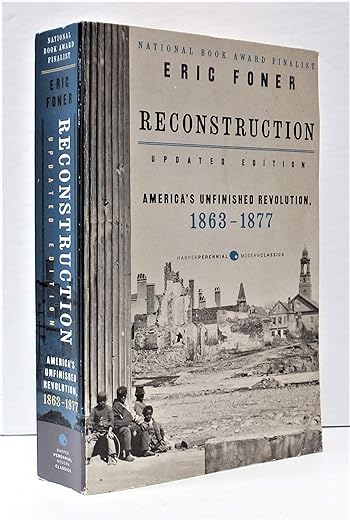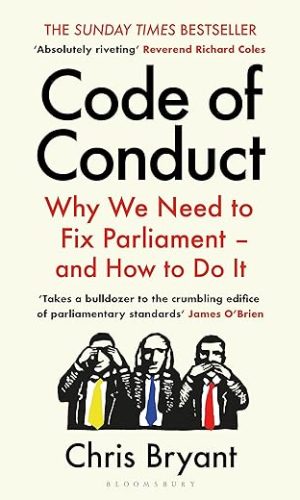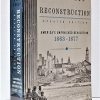Reconstruction Updated Edition: America’s Unfinished Revolution, 1863-1877 (Harper Perennial Modern Classics)
£13.70£18.00 (-24%)
From the “preeminent historian of Reconstruction” (New York Times Book Review), the prize-winning classic work on the post-Civil War period that shaped modern America.
Eric Foner’s “masterful treatment of one of the most complex periods of American history” (New Republic) redefined how the post-Civil War period was viewed.
Reconstruction chronicles the way in which Americans—black and white—responded to the unprecedented changes unleashed by the war and the end of slavery. It addresses the ways in which the emancipated slaves’ quest for economic autonomy and equal citizenship shaped the political agenda of Reconstruction; the remodeling of Southern society and the place of planters, merchants, and small farmers within it; the evolution of racial attitudes and patterns of race relations; and the emergence of a national state possessing vastly expanded authority and committed, for a time, to the principle of equal rights for all Americans.
This “smart book of enormous strengths” (Boston Globe) remains the standard work on the wrenching post-Civil War period—an era whose legacy still reverberates in the United States today.
Read more
Additional information
| Publisher | Harper Perennial Modern Classics, Updated ed edition (1 Jan. 2015) |
|---|---|
| Language | English |
| Paperback | 752 pages |
| ISBN-10 | 0062354515 |
| ISBN-13 | 978-0062354518 |
| Dimensions | 4.32 x 14.99 x 22.61 cm |











by stephen lewis
Eric Froner provides a comprehensive, fascinating, and compelling review on post civil war America. Reconstruction explains how a great opportunity to rebalance Southern society by providing political and economic opportunities failed. The book demolishes a commonly held view that the post civil war imposed governments were totally inept and corrupt. I was surprised to learn how few blacks did secure federal and state representation. I was surprised to learn how by and large those blacks that did make it into government appear to have acted reasonably and were no more guilty of corruption than their white counterparts. I was frankly astonished to learn about various massacres of blacks seeking to retain their voting rights as Reconstruction ended. Such mass shooting and assassinations appear to just never been recorded in the history books. I was further surprised how the “occupation” of the South was another myth: that the Union army occupying the south never exceeded 20,000 men – and had been reduced to almost a token force of 6,000 by the mid 1870.s,, The book concludes how the Republican support for equality became replaced by the desire to redeploy the army to control the labour unrest related to the depression of 1872. The result: 100 years of inequality, oppression, and “fake history” the legacy of which continues to this day.
by D_S
Foner’s book is undoubtedly the best look at the Reconstruction period from its roots in the Civil War to its unfortunate destruction in the 1870s. The activities, hopes, and legislators of the black south are placed at the centre of his story. This makes for some emotional reading, as we see how their initial high hopes were eventually crushed by hostile forces. It is easy to make the reductionist claim that Reconstruction was nothing but a doomed failure, and that its white patrons were never too committed. Foner challenges this take. He uses examples from across southern states to show that black political and civic equality indeed rose during Reconstruction, reaching a level that was never reached again until after the 1960s Civil Rights movement. Blacks finally received the opportunity to build schools, become literate, and fight for their worker rights as sharecroppers. Reconstruction produced the South’s first real public education systems. Blacks openly challenged abusive employer practices, like the leasing of convict labour or the use of rigged contracts. The federal Freedmen’s Bureau restrained its own activity due to its ‘pull yourself up by your bootstraps’ ideology of meritocratic labour, but it was still loved by blacks for its school systems and legal services that protected civil equality. Poor whites often benefited from these policies. Unfortunately, this early progress failed to continue due to economic downturns and a lack of external investment. Changes in crop prices and the reluctance of northerners/immigrants to move South hurt development. Tax increases often proved unpopular with whites of all backgrounds. Within the Southern Republican parties, there were divisions that hampered growth. Northern ‘carpetbaggers’ wanted swift economic reforms and growth, southern white Republicans disliked taxes and desired debt relief, and blacks wishes to focus on expanding state services. Economic and social equality ended up stagnating- no state made real progress on this front, with blacks failing to progress from low-income occupations and social separation.
But political rights were nevertheless enormously valued- black voter turnout surged in every part of the south. For the first time there were black sheriffs, police officers, and state/local officials with real power. The white planter elite was sidelined from leadership positions. Most of the Reconstruction-era South managed to resist KKK/Democrat violence to elect Ulysses Grant in 1868 and 1872.
Perhaps Foner’s most important contribution is debunking the Dunning School’ view of the failings of Reconstruction. Reconstruction did not end due to blacks’ incompetence or venality. Black politicians were the clear junior partners in Reconstruction, except perhaps for a brief period in ~1870s Louisiana and South Carolina. Rather, white elites from both parties had the lion’s share of responsibility. Reconstruction governments’ corruption largely involved white-run railroads and a mostly-white political leadership, both Democrat and Republican. This corruption was also no worse than that seen in the North or West at this time, where political machines and businesses worked hand-in-glove. Corruption played a smaller role than white southerners’ rage at ‘illegitimate’ ‘Africanised’ rule. Apart from some areas inhabited by working-class white ‘Scallywag Republicans’, the white South largely supported the supremacist Democrat party. Democrats feigned moderation at times, but their extensive use of the KKK to terrorise blacks and Scallywags revealed the truth. The planter elite managed to ‘redeem’ the South one state at a time, employing the twin tactics of violence and white solidarity propaganda. Republican state governments were overthrown in blatant coups or through intimidation. Southern Whigs had thrown their support behind the Democrats from the start. After ‘Redemption’, even a few disaffected Scallywag leaders joined the reestablished Democrat elite.
Foner seals his claim for the greatest Reconstruction historian by outlining in detail the Northern Republicans’ betrayal of the black south. Without this betrayal, the ‘redemption’ could not have succeeded throughout the South. Despite dispatching federal troops to stem KKK violence during his first term, President Grant meekly acquiesced to the growing voices in his party who favoured reconciliation with the South and the planter elite. These Republicans were often fuelled by class anxiety over growing labour agitation in the North. Working-class movements and unions spiked after the 1873 economic crisis, which halted the North’s Whiggish transformation into an expanding economic powerhouse. Soon the majority of Republicans, including multiple abolitionists, took up the mantra that black Americans were incapable of progress and Reconstruction must end. Their commitment to an activist central state collapsed. The 1876 election compromise that ended the last standing Reconstruction governments was seen as almost inevitable at the time. White northern elites, especially the business community, abandoned their most loyal constituents. They focused instead on stopping union mobilisation, while also dabbling with imperial expansionism, anti-‘communism’, anti-Chinese sentiment, and temperance movements. The voices of the last remaining Radical Republicans were drowned out. Charles Sumner died while trying to pass a civil rights bill, while the anti-racist pro-labour Wendell Philipps and Benjamin Butler were marginalised. The Radical ideology itself, which once controlled the party and had helped begin Reconstruction by overruling the pro-reconciliation Andrew Johnson, died out. Johnson, who advocated white supremacy and a white yeomen-planter alliance to rule a readmitted south, got his wish in the end. The resurgence of an elitist caste system was euphemised as an exercise of states’ rights and self-government.
But the fact that Reconstruction lasted for years shouldn’t be forgotten. The ascension of blacks to Congress and Lt. Governor positions was historic. One comes away thinking that Lincoln-like leadership and political will from white elites could have prolonged the ‘Forgotten Revolution’. Unfortunately, it would take another 90 years for such a state of affairs to happen again
by Louis Turner
Foner tells the story of how the liberated slaves were brought back under Southern white control. This is detailed history, so is not easy reading.
by Mrs. Sarah Catrin Morgan
I imagine this would be a really useful book for those studying Reconstruction in depth, but in terms of reading for pleasure, I wouldn’t recommend it; Foner writes rather tediously. That said, I did learn a lot from the book.
by Brandon wood
One of the best books on the period of reconstruction in America, a must read for anybody who wants to know about this particular period of history
by Mr Joel A Williams
It’s surprisingly hard to find a comprehensive book on Reconstruction – especially compared to the multitude of books on the Civil War itself. It’s a deeply sad story of ideals turned into reality (the Radical Republican Congress of 1877-8) but then allowed to fail once an economic crisis appeared, key influencers died, and a disputed election needed resolving. It reads like proper history, not just narrative, although I occasionally experienced chronological confusion as a result. Strongly recommended.
by aurora
A revision of an earlier version. Curious how having fought a war, at least in part, to emancipate the slaves of the American south, they then worked hard to keep the wretched people at the bottom of the pile. The anger of black people is hardly to be wondered at in our present age.
by John Beach
I bought this book to go with a course at Columbia University run by Prof. Foner. He is an excellent lecturer and this is reflected in the book which is lucid and easily accessible.